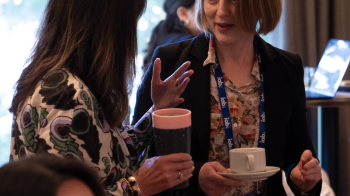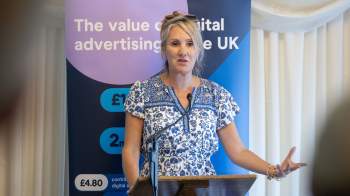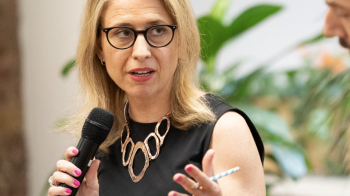HFSS Member Forum: “We need to come together to find solutions”
IAB UK
Following the Government's announcement that it will be introducing a 9pm watershed on HFSS online ads - and potentially an outright ban - we brought industry experts together to answer members’ key questions
“With the Government's unprecedented announcement just a little over a week old, the aim of this event is for you to come away more informed than you are right now”, said IAB UK’s CMO James Chandler, opening our Member Forum on the proposed HFSS online ad ban.
Bringing together speakers including the Advertising Association’s Director of Public Affairs Sue Eustace, Mindshare UK’s CEO Jem Lloyd-Williams, Facebook’s UK Public Policy Manager Karim Palant, News UK’s Commercial Director of Publishing Ben Walmsley, CAP’s Regulatory Policy Executive Andy Taylor and our own Head of Policy and Regulatory Affairs Christie Dennehy-Neil, the event was - as James put it - “a forum in its truest sense”, with attendees putting their most pressing questions to the experts. So what was said?
Proportionate action is needed
It was widely agreed by the speakers that what the Government’s current plan isn’t a proportionate response to its own evidence, which shows that an online ad watershed would have minimal impact on children’s exposure to ads for High Fat, Salt and Sugar (HFSS) products and an “inconclusive” effect on adults. The Advertising Association’s Sue Eustace also pointed to the fact the Government is using out-of-date and small-scale studies to back up its proposed policies, which she described as “an astonishing basis for such drastic policy proposals”.
However, while IAB UK’s Christie Dennehy-Neil succinctly described the proposed ban as “a populist measure that the evidence doesn’t support”, the panel acknowledged that solely pointing to the evidence isn’t going to swing the balance. The challenge now is to make a compelling case for more suitable, proportionate and workable measures that will minimise the unintended consequences of further restrictions on the digital ad economy. To quote News UK’s Ben Walmsley: “We need proportionate action that will achieve the intended outcome.” As things stand - given the breadth of the food and drink products and ad formats that we expect to be covered by the measures - he said that 60% of News UK’s grocery category would be affected by a ban.
The restrictions proposed aren’t workable
To recap, the Government has said that it will be introducing a 9pm watershed on all HFSS advertising online and TV by the end of 2022, and that it will consult on how it can implement an outright ban online. While the panel accepted that action will need to be taken by the industry to meet the Government's concerns, neither of these courses of action are seen to be workable or likely to be effective.
In the case of an online watershed, Facebook’s Karim Palant argued that it should be targeting-based rather than time-based - in closer accordance with current targeting rules on HFSS ads to children. As he put it: “It’s about devising a digital watershed that leans on the existing mechanisms that we all use to target digital ads.” In a similar vein, CAP’s Andy Taylor said that the current watershed plan is in “danger of bolting on this monolithic watershed concept” essentially created for broadcast, but not effectively translatable online.
On the prospect of an outright online ad ban for HFSS products, Walmsley said that a blanket ban would inevitably result in the same money flowing elsewhere, with the general feeling among the speakers being that such a blunt solution doesn’t account for the complex and multifaceted causes of obesity.
Collaboration is the way forward
We need to use “one voice and find a better solution” was Mindshare UK’s Jem Lloyd-Williams’ view. He also drew attention to the need for more understanding within the industry about the issue and the role that brands can play in helping to solve it.
Moving forward, Dennehy-Neil said that collaboration should be focused on building a compelling case and strategy, rather than just pointing to the evidence as this is currently being ignored by the Government. She also said that to truly effect change, we need to collectively move beyond the simple ‘cause and effect’ narrative that advertising is driving over-consumption rather than the reality, that it largely functions to grow brand share.
The need for collaboration was echoed throughout the panel with Eustace summing up: “We are facing restrictions and we need to come together to find solutions that take us further than the current rules, but that are workable.”
Members can watch a full recording of the event here and don’t hesitate to get in touch if you have any questions. Also take a look at our HFSS Q&A and listen to our recent podcast for more.
Related content
CAP issues updated LHF guidance for consultation
Learn moreGovernment confirms brand ads exemption in LHF ad ban
Learn moreLHF ad ban guidance for TV+ platforms
Learn moreTrade bodies launch resources to help industry prepare for LHF ad ban
Learn more
Fast forward to 2030 with Futurescape
An in-depth exploration of the attitudes, innovations and media shifts that will shape the years ahead and redefine how we advertise by the turn of the decade



